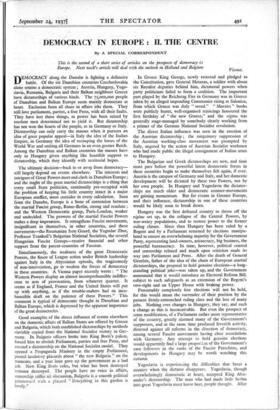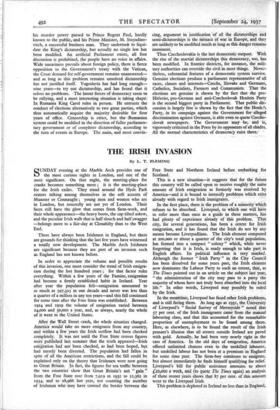DEMOCRACY IN EUROPE : H. THE CENTRE
By A SPECIAL CORRESPONDENT
This is the second of a short series of articles on the prospects of democracy 1;1 Europe. Next week's article will deal with the outlook in Holland and Belgium Vienna.
DEMOCRACY along the Danube is fighting a defensive battle. Of the six Danubian countries Czechoslovakia alone retains a democratic system ; Austria, Hungary, Yugo- slavia, Rumania, Bulgaria and their Balkan neighbour Greece have dictatorships of various kinds. The 75,000,000 people of Danubian and Balkan Europe seem mainly democrats at heart. Exclusion from all share in affairs irks them. They still love parliament, parties, a free Press, with all their faults. They have lost these things, as power has been seized by resolute men determined not to yield it. But dictatorship has not won the hearts of the people, as in Germany or Italy. Dictatorship can only carry the masses when it pursues an idea of great popular appeal—in Italy the idea of the Italian Empire, in Germany the idea of recouping the losses of the World War and uniting all Germans in an even greater Reich. Among the Danubian and Balkan countries the masses have only in Hungary given anything like heartfelt support to dictatorship, which they identify with territorial hopes.
The ultimate decision—back to or away from democracy— will largely depend on events elsewhere. The interests and intrigues of Great Powers meet and clash in Danubian Europe ; and the might of the great martial dictatorships is a thing that every small State politician, continually pre-occupied with the problem of keeping his little country intact in a major European conflict, must consider in every calculation. Seen from the Danube, Europe is a bone of contention between the martial Fascist group, Rome-Berlin, strong and resolute ; and the Western Democratic group, Paris-London, weaker and undecided. The prowess of the martial Fascist Powers makes a deep impression. It strengthens Fascist movements, insignificant in themselves, in other countries, and these movements—the Roumanian Iron Guard, the Yugoslav Zbor, Professor Tzankoff's Bulgarian National Socialists, the several Hungarian Fascist Groups—receive financial and other support from the parent-countries of Fascism.
Simultaneously, the weakness of the great Democratic Powers, the fiasco of League action under British leadership against Italy in the Abyssinian episode, the tragicomedy of non-intervention, go to weaken the forces of democracy in these countries. A Vienna paper recently wrote : " The Western Powers display an almost incomprehensible indiffer- ence to acts of provocation, from whatever quarter. It seems as if England, France and the United States will put up with anything, as if the trouble-makers had an inex- haustible draft on the patience of these Powers." This comment is typical of democratic thought in Danubian and Balkan Europe, which is depressed by the apparent impotence of the great democracies.
Good examples, of the direct influence of events elsewhere on the domestic affairs of Balkan States are offered by Greece and Bulgaria, which both established dictatorships by methods slavishly copied from the National Socialist victory in Ger- many. In Bulgaria officers broke into King Boris's palace, forced him to abolish Parliament, parties and free Press, and erected a dictatorship on the National Socialist model. They opened a Propaganda Ministry in the empty Parliament, posted laudatory placards about " the new Bulgaria " on the tramcars, and a year later gave up the government as a bad job. Now King Boris rules, but what has been destroyed remains destroyed. The people have no voice in affairs, censorship stifles all discussion, Bulgaria is a smooth political greensward with a placard " Everything in this garden is lovely." In Greece King George, newly restored and pledged to the Constitution, gave General Metaxas, a soldier with about six Royalist deputies behind him, dictatorial powers when party politicians failed to form a coalition. The important part played by the Reichstag Fire in Germany was in Greece taken by an alleged impending Communist rising at Salonica, from which Greece was duly " saved." " Marxist " books were publicly burnt, well-organised rejoicings honoured the first birthday of " the new Greece," and the regime was generally stage-managed by somebody clearly working from a primer of the German National Socialist revolution.
The direct Italian influence was seen in the erection of the Austrian dictatorship ; the sanguinary suppression of the Austrian working-class movement was prompted by Italy, angered by the action of Austrian Socialist workmen who had made public the illegal consignment of Italian arms to Hungary.
The Bulgarian and Greek dictatorships are new, and time must pass before the powerful latent democratic forces in these countries begin to make themselves felt again, if ever. Austria is the catspaw of Germany and Italy, and her domestic development will be dictated by these two Powers, not by her own people. In Hungary and Yugoslavia the dictator- ships are much older and democratic counter-movements are gaining momentum. But for events in Greater Europe, and their influence, dictatorship in one of these countries would be likely soon to break down.
Hungary was the first defeated country to throw off the regime set up, in the collapse of the Central Powers, by war-weary populations, and to restore power to the former ruling classes. Since then Hungary has been ruled by a Regent and by a Parliament returned by elections manipu- lated to ensure an overwhelming majority for the Government Party, representing land-owners, aristocracy, big business, the powerful bureaucracy. In time, however, political control and censorship relaxed and much open criticism made its way into Parliament and Press. After the death of General Combos, father of the idea of the chain of European martial dictatorships, the proposal to hold genuine elections—a long- standing political joke—was taken up, and the Government announced that it would introduce an Electoral Reform Bill; subject to such safeguards as an extension of the Regent's veto-right and an Upper House with braking power.
Presumably completely free elections will not be held, for this would mean the surrender of their position by the present firmly-entrenched ruling class and the loss of many jobs. Nothing ever changes in Hungary, they say, and such a change as this is inconceivable. But even the prospect of some modification, of a Parliament rather more representative of the country, greatly alarmed many of the Government's supporters, and at the same time produced feverish activity, directed against all reforms in the direction of democracy, among several Fascist movements having close associations with Germany. Any attempt to hold genuine elections would apparently find a large proporci3n of the Government's own followers in the ranks of the Fascist Putschists, and developments in Hungary may be worth watching this autumn.
Yugoslavia is experiencing the difficulties that beset a country when the dictator disappears. Yugoslavia, though overwhelmingly democratic at heart, accepted King Alex- ander's dictatorship. The man who had made little Serbia into great Yugoslavia must know best, people thought. After his murder power passed to Prince Regent Paul, hardly known to the public, and his Prime -Minister, M. Stoyadino- vitch, a successful business man. They undertook to liqui- date the King's dictatorship, but actually no single law has been modified. An artificial Parliament exists, all free discussion is prohibited, the people have no voice in affairs. Wide uneasiness prevails about foreign policy, there is fierce opposition to the Government's treaty with the Vatican, the Croat demand for self-government remains unanswered— and as long as this problem remains unsolved dictatorship has not justified itself. Yugoslavia has had long enough— nine years—to try out dictatorship, and has found that it solves no problems. • The latent forces of democracy seem to be rallying, and a most interesting situation is taking shape. In Rumania King Carol rules in person. He entrusts the conduct of elections alternatively to two great parties, which thus automatically acquire the majority desirable for four years of office. Censorship is strict, but the—Rumanian system could be modified in the direction of fuller parliamen- tary government or of completer dictatorship, according to the turn of events in Europe. The main, and most convin- cing, argument in justification of all the dictatorships and semi-dictatorships is the menace of war in Europe, and they are unlikely to be modified much as long as this danger remains imminent.
Thus Czechoslovakia is the last democratic outpost. With the rise of the martial dictatorships this democracy, too, has been modified. In frontier districts, for instance, the mili- tary authorities can override the civil in most things. Never- theless, substantial features of a democratic system survive. Genuine elections produce a parliament representative of all races, classes and interests—Czechs, Slovaks and Germans, Catholics, Socialists, Farmers and Communists. That the elections are genuine is shown by the fact that • the pro- Hitlerist, pro-German and anti-Czechoslovak Henlein Party is the second biggest party in Parliament. That public dis- cussion is largely free is shown by the fact that the HenleIt Party, in its campaign against the Government for alleged discrimination against Germans, is able even to quote Czecho- slovak newspapers. The Government may be, and is, vigorously criticised in the Press by its opponents of all shades. All the normal characteristics of democracy exist there. '



















































 Previous page
Previous page